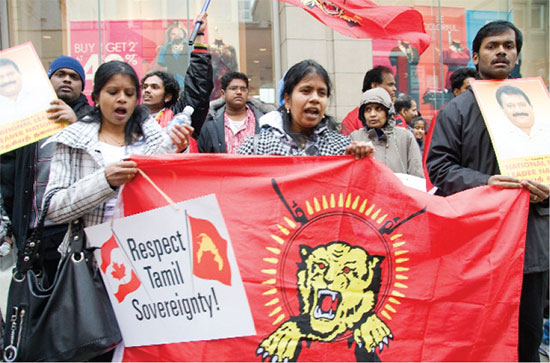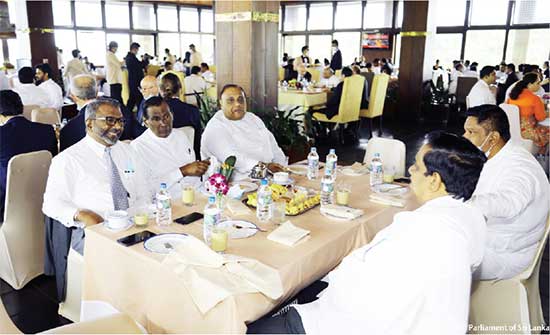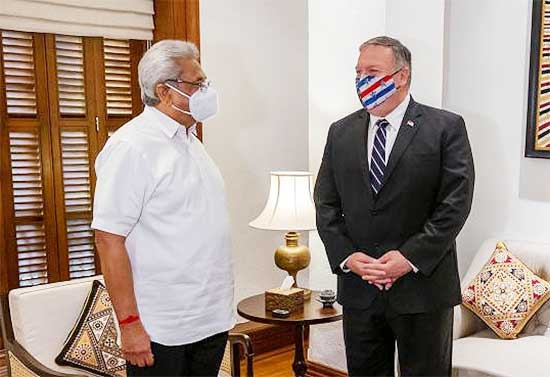SPECIAL REPORT : Part 344
The LTTE ordered protests in Europe and Canada in 2009 in a bid to pressure Sri Lanka to halt the military offensive on the Vanni east front. Canadians of Sri Lankan origin protest in Toronto in March 2009 in support of the LTTE project. The UK Foreign Secretary Miliband and his French counterpart Kouchner made an abortive bid to stop the offensive late April 2009 (file photo)
By Shamindra Ferdinando
The Tamil community never explained why the predominately Tamil-speaking Northern and Eastern districts voted overwhelmingly for war-winning Army Commander General Sarath Fonseka at the 2010 general election, after earlier accusing him, and his war winning Army, of war crimes, the writer told a webinar, organized by the Sri Lankan Canadian Action Coalition, on Sunday (Nov 22). The writer questioned the absurdity in war crimes accusations against the backdrop of the Tamil National Alliance (TNA), the LTTE mouthpiece, throwing its weight behind Fonseka, Sri Lanka’s only Field Marshal, at the crucial poll. In spite of the Tamil vote, Fonseka suffered a heavy defeat. Fonseka lost by over 1.8 mn votes.
Sunday’s webinar, moderated by Prof. Neville Hewage, was the latest in a series organized by the grouping. The 90-minute webinar dealt with Democracy Under Threat: Incitement and Glorification of LTTE terrorism during Maaveerar naal.
The writer made his presentation subsequent to one-time US Colombo Embassy staffer, and now US-based Daya Gamage (author of Tamil Tigers’ debt to America: US Foreign Policy Adventurism; Sri Lanka’s Dilemma) and Geneva-based Prof. Dr. H.C. Mehmet Guzel, of the Centre for Peace and Reconciliation Studies.
The writer’s presentation: Western Governments’ response to various situations is largely based domestic political concerns. The Western powers conveniently calling themselves the international community, is responding to post-war developments in Sri Lanka, depending primarily on the relationship between the Tamil Diaspora and major political parties therein.
Over a decade after the successful conclusion of the war, the separatist agenda remains a viable threat, though the revival of the once-feared conventional military capability of the LTTE is no longer in the horizon.
However, the LTTE’s defeat has made it easier for Western powers to work with influential Tamil groups, pursuing a common agenda, with some lawmakers represented in the Sri Lanka Parliament.
Regardless of what foreign governments, and Tamil Diaspora groups, say, it is nothing but a political arrangement meant to secure the latter’s support at crucial elections.
What the LTTE couldn’t achieve, through terrorism and military means, its rump and followers might be able to secure with foreign intervention. That is a reality, a possibility Sri Lanka cannot ignore.
Stimulation and glorification
of terrorism
The stimulation and glorification of terrorism, through costly propaganda campaigns and political exercises, at the expense of elected governments here, portend a grave threat to post-war Sri Lanka.
Unfortunately, Sri Lanka’s political setup conveniently ignored the growing threat much to the discomfort of those who strongly believe in the country’s unitary status.
In fact, the LTTE’s defeat has paved the way for Western powers to move the UN in support of those seeking a new Constitution, at the expense of the country’s unitary status; the October 2015 Geneva
The resolution co-sponsored by the treacherous Sirisena-Wickremesinghe government is a case in point.
For want of cohesive action on the part of successive Sri Lankan governments, including the war-winning Rajapaksa administration, that brought the war to a successful conclusion, in May 2009, some of those who had pursued a separatist agenda, though not really involved with the LTTE, during the war, are now at the forefront of high profile diaspora projects meant to divide the country on ethnic lines. Their successes largely depend on overseas political support and backing received from INGOs.
On one hand, a section of the international community accommodated separatist elements and made them a part of their domestic political system, while undermining Sri Lanka, by adopting the war crimes resolution in Geneva in 2015. The Geneva intervention is nothing but glorification of those who waged war against a member State of the UN. The Geneva project should be examined against the backdrop of the annual commemorative events, held in various parts of the world, with the backing of both governments as well as their Opposition political parties. Growing number of voters, of Sri Lankan origin, living in different countries, a lucrative industry in accommodating asylum seekers and human rights lobby, contribute to the mounting insidious campaign against Sri Lanka. Actually, Sri Lanka now faces a bigger threat in spite of the eradication of the LTTE’s military capacity.
TNA strategy
One-time LTTE mouthpiece, the TNA succeeded in compelling Sri Lanka to launch a new constitution-making process, severely inimical to the country. That project had the backing of the US and the UN and could have succeeded, if not for Treasury bond scams perpetrated by the then ruling party, resulting in political turmoil. What Sri Lanka should keep in mind is that the absence of a military threat does not mean the country’s unitary status cannot be challenged and overwhelmed by other means. Having backed General Sarath Fonseka’s presidential polls campaign, in 2010, and Maithripala Sirisena’s five years later, the TNA proved its readiness to change its political tactics with an eye on its overall strategy to break up the country. Thanks to Wikileaks, the role played by the US in the formation of the UNP-led alliance, to back Fonseka, is in the public domain. It would be a grave mistake, on our part, to ignore such developments, while opposing propaganda exercises, such as annual commemorative events. The real threat comes from Western politicians seeking electoral arrangements, with Tamil groups in their countries, for votes.
Before discussing further the post-war relationship between foreign political parties and Tamil groups, let me recollect the Indian intervention in Sri Lanka. Why did India militarily intervene in Sri Lanka in the 80s? The late J.N. Dixit, in early 2004, revealed hitherto unknown reasons for their intervention. Referring to Sri Lanka’s relationship with the US, Israel and Pakistan, Dixit explained why the then Prime Minister Indira Gandhi threw her weight behind Sri Lankan terrorist groups. Dixit, one-time Indian High Commissioner in Colombo, asserted in ‘Makers of India’s Foreign Policy’ that Premier Gandhi could be faulted on two foreign policy decisions. Let me quote: “…her ambiguous response to the Russian intrusion into Afghanistan and her giving active support to Sri Lankan Tamil militants. Whatever the criticisms about these decisions, it cannot be denied that she took them on the basis of her assessments about India’s national interests. Her logic was that she couldn’t openly alienate the former Soviet Union when India was so dependent on that country for defence supplies and technologies. Similarly, she could not afford the emergence of Tamil separatism, in India, by refusing to support the aspirations of Sri Lankan Tamils. ….” Dixit added: “In both cases, her decisions were relevant at the point of time they were taken.”
In other words, India jeopardized Sri Lanka to protect her interests. The Indian project paved the way for an attempt to overthrow the Maldivian government in early Nov 1988. Indian-trained Sri Lankan terrorists almost succeeded in seizing control of that country. Perhaps, such raids are not possible today though foreign governments overtly and covertly support those seeking to subvert other countries.
British policy
The British relentlessly pursue an anti-Sri Lanka policy. Maybe their approach is the worst among the countries still backing the LTTE agenda, a decade after the war ended, with the crushing military defeat of the Tigers. British actions promoted terrorism in a big way, while undermining Sri Lanka. Long standing
British policies are inimical to Sri Lanka. They brazenly played politics with Sri Lanka, throughout the war, finally making a last ditch attempt to save the LTTE, in 2009. If the British-French bid to halt the Sri Lankan military offensive succeeded, in April 2009, terrorism would have received unprecedented recognition. The British glorified terrorism, still do for political reasons though all politicians cannot be faulted. However, the British, now the leading country in the Sri Lanka Core Group is pursuing war crimes investigation against us under the 2015 Geneva Resolution by remaining its key supporter.
Having failed to save the LTTE, the UK, a member of the Geneva-based United Nations Human Rights Council (UNHRC), now pursues war crimes probe as part its overall efforts to appease British voters of Sri Lankan Tamil origin. The UK has refused to consider wartime cables from its High Commission in Colombo! Those classified cables, dispatched by its Defence Advisor, in Colombo, in January-May 2009, and exposed by Lord Naseby, in Oct 2017, disputed the very basis of the Geneva Resolution. Lord Naseby had to utilize the Freedom of Information Act 2000 to secure the documents. The British tried desperately to prevent the release of those documents.
A leaked May 2009 US diplomatic cable, originating from its mission in London, a few months after the war, proved the relationship between the Tamil Diaspora and the British establishment. Thanks to Wikileaks, we know why the British played dirty politics with Sri Lanka and still do. A statement attributed to the then Foreign Secretary David Miliband revealed the Labour Party’s dependence on Tamil voters. The ground situation remains the same. With the Sri Lankan Tamil population in the UK, numbering well over 300,000, and further growing, the British will continue their despicable strategy. That is the undeniable truth.
So it is no wonder the US and UK are now all-out to persecute (not prosecute) Wikileaks Head Julian Assange for exposing to the world the unpalatable truth about what happened to Sri Lanka and other victimized countries. Sri Lanka shouldn’t expect the British or the Canadians to give up their cozy relationship with the Tamil Diaspora for our benefit. Politics is a dirty game. The bulk of our own politicians and utterly corrupt parliamentary system, over the years, proved over and over again political interests always come ahead of national interests.
Genocide charge
At the commencement of the new Parliament, several moons ago, two lawmakers, both leaders of the Jaffna-based political parties, C.V. Wigneswaran and Gajendrakumar Ponnambalam accused the war-winning military of genocide. The Speaker upheld their right to speak freely in Parliament.
Sri Lanka Parliament never found fault with the TNA, that functioned as the political wing of the LTTE, during the conflict, and went to the extent of recognizing Prabhakaran as the sole representative of the Tamils. The TNA glorified the LTTE. Some of its members participated in passing out parades of forcibly recruited children and, at the 2005 presidential election, ordered Tamils not to vote. But no one bothered to take up this issue with the TNA leadership. After the war, the TNA established a close working relationship with the UK-headquartered Global Tamil Forum (GTF). The GTF played its cards well. The GTF once employed Labour lawmaker Joan Ryan as its Chief Executive and Policy Advisor. Why should we be surprised over an MP being on the GTF’s payroll, especially against the backdrop of it having parliamentary recognition? Many do not know the inauguration of the GTF took place in the British Parliament, in early 2010, with the participation of top political party representatives. Later, Ryan returned to Parliament to continue her role. Perhaps, many Sri Lankans may not be aware of how Ryan along, with Siobhain McDonagh, MP, requested the Foreign Secretary to expel Sri Lankan Defence Attaché Brigadier Priyankara Fernando over what they called “inappropriate, unacceptable and threatening” conduct of the officer. McDonagh, in Sept 2011, declared, in Parliament, that the Sri Lankan military killed 100,000 Tamils, including 40,000 civilians, in January-May 2009 alone. In 2012, McDonagh, along with an Australian MP, nominated ITN Channel 4 team, that produced “Sri Lanka Killing Fields,” for the Nobel Peace Prize.
Balasingham receives special treatment
The British had a way with the Diaspora. The Special treatment afforded to British citizen of Sri Lankan Tamil origin, Anton Balasingham, underscored the UK policy. British citizen Balasingham, a former British High Commission employee in Colombo, was allowed to function as the LTTE’s advisor in spite of proscription of the group. The British policy remained the same, even after the LTTE assassinated Indian leader Rajiv Gandhi, in May 1991, and Sri Lankan Foreign Minister Lakshman Kadirgamar, in August 2005. Instead of stripping Balasingham of given nationality, the British facilitated a secret meeting between a high level Norwegian delegation, and Balasingham, in the UK, to discuss the Kadirgamar assassination.
Terrorism received a mega boost when the UK’s Conservative Party, in the run-up to the Dec 2019 general election, proposed, what it called, a two State solution to solve the Sri Lankan problem. The Conservative manifesto declared: “We will continue to support international initiatives to achieve reconciliation, stability and justice across the world, and in the former conflict zones such as Cyprus, Sri Lanka and the Middle East, where we maintain our support for a two-state solution.”
Sri Lanka opposed that statement. In the wake Colombo’s opposition, the Conservative Party, claimed the two-state solution was a reference to the Israel-Palestine situation. The UK’s policy is nothing but horrible. Balasingham’s widow, Adela, often pictured handing over cyanide capsules to LTTE terrorists, is living in the UK.
Promoting terrorism the British way
The UK obviously promoted terrorism by bending backwards to appease Tamil voters. There cannot be a better example than the Tamils forcing Cineworld, Odeon and Vue to cancel the screening of Shoojit
Sircar’s ‘Madras Café’ in late 2013. Tamils threatened the UK with violence if cinemas went ahead. Have you ever heard of Diaspora of any origin threatening violence over the screening of a movie? What the Tamils couldn’t stomach was ‘Madras Café’ portrayal of the LTTE assassination of Rajiv Gandhi, a despicable crime that deeply wounded India, the god father of terrorism in Sri Lanka.
In March 2011 ahead of the Geneva session, the United States Assistant Secretary of State for South and Central Asia, Robert Blake, who was also one-time US Ambassador in Colombo, received a top GTF delegation in Washington. GTF’s President Rev Father S.J. Emmanuel led the delegation. I had the opportunity to meet the GTF President in London in early 2015 soon after him, in the company of other GTF live wire Suren Surendiran, met the Sri Lanka Government delegation, led by President Sirisena. Recent Canadian rejection of a petition by MP Gary Anandasangaree seeking government support for a legislative effort to remove sovereign immunity as a defense by States against genocide, crimes against humanity, war crimes, torture and enforced disappearances is certainly something Sri Lankan-Canadian Action Coalition can be quite proud of. Canada also rejected Anandasangaree’s call to refer Sri Lanka to the Committee established under the Convention Against Enforced Disappearances under its Article 32. However, Sri Lanka should be cautious of on-going moves in different countries to pressure Sri Lanka over accountability issues.
The move to do away with the UK ban on the LTTE may give a turbo boost to separatist agenda. The UK’s Proscribed Organizations Appeal Commission found that a 2001 decision to keep the ban on the LTTE was “flawed” and unlawful, and may open the way for the proscription to be lifted. It would be pertinent to mention that foreign governments tolerate various Diaspora groups because they can be used to exert pressure on targeted administrations. Nothing can be further from the truth that Western governments are interested in human rights. The world knows how US-British coalition cooked up Weapons of Mass Destruction (WMD) allegations to invade Iraq in 2003. Those Iraqis who cooperated with Western powers were hailed heroes. The US-UK project destroyed Iraq.
Sri Lanka needs a cohesive action plan to counter lies. Our failure has caused setbacks. In the absence of a tangible action plan, the country suffered badly. Sri Lanka remains in Geneva’s agenda it is proven by the fact that much celebrated Lt. Gen. Shavendra Silva has been categorized as a war criminal on mere hearsay. Our failure to prove our innocence is even worse than glorification of terrorism.




 Let me reproduce Ambassador French’s statement verbatim: “In 2015, Sri Lanka co-sponsored resolution 30/1, which provided a framework to address the legacy of conflict and build the foundations for sustainable and inclusive peace. Sri Lanka committed to delivering progress on accountability, reconciliation and human rights with the support of the Council and reaffirmed those commitments through two further resolutions. As the High Commissioner’s report highlights, these resolutions have their origins in Sri Lanka’s domestic processes.
Let me reproduce Ambassador French’s statement verbatim: “In 2015, Sri Lanka co-sponsored resolution 30/1, which provided a framework to address the legacy of conflict and build the foundations for sustainable and inclusive peace. Sri Lanka committed to delivering progress on accountability, reconciliation and human rights with the support of the Council and reaffirmed those commitments through two further resolutions. As the High Commissioner’s report highlights, these resolutions have their origins in Sri Lanka’s domestic processes.